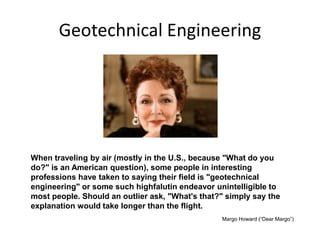Not known Details About Geotheta
Wiki Article
Some Known Facts About Geotheta.
Table of ContentsThe 8-Minute Rule for GeothetaFascination About GeothetaGeotheta for BeginnersNot known Factual Statements About Geotheta
They team up with civil designers, architectural engineers, designers, and other specialists to integrate geotechnical considerations right into the general task layout and building and construction procedure. This requires reliable teamwork, coordination, and interaction to make sure that the geotechnical facets line up with the task purposes and meet regulative demands.Mining & Materials Engineering: Principles of exploration, infiltration rates, and elements influencing the choice of boring approach. Qualities of dynamites, firing systems and blast patterns. Blasting methods in surface area and underground functions. Special blasting techniques at excavation perimeters. Resonance and sound control. Mechanical and constant approaches to fragmentation, including longwall shearing and fullface boring.
Modelling of fragment and fragment size circulations; comminution as a transfer function. Comminution innovation: squashing, grinding, dimension classification. Integrated evaluation of fragmentation and comminution procedures. Supplied by: Mining & Materials Design.
The Only Guide for Geotheta
Bachelor's level programs in civil, geotechnical, geological, and ecological design normally last 4 years and include basic education and learning training courses in English, social science, and the liberal arts, along with courses in advanced mathematics, structural geology, and fluid mineralogy. (https://soundcloud.com/geotheta)Geotechnical design involves the analysis of the soil and rock conditions at a specific site, and their implications for the development of that site. As most structures depend on the ground for support, it lacks shock that a detailed understanding of the ground conditions, and the suitability of foundation systems, are vital to the long-term security and efficiency of the building or framework.
Specialising in the examination of geological formations and ground practices, geotechnical engineers do scientific investigations and screening to recognize the influence these geological developments may carry the style and building of building, civil and framework projects. This expertise is vital for the design and building of buildings, roadways, tunnels, dams, bridges, and water and sewer systems.
The geotechnical group at Douglas Allies routinely consult with architects, design engineers, developers, and building contractors to make referrals on layout and development propositions to make certain that the developed frameworks are appropriately developed for the ground problems. As an example, the layout of footing systems needs to consider the weight of the structure, the capability of the ground to sustain that weight along with activity tolerances and effective building and construction.
The Ultimate Guide To Geotheta
This job is substantially simplified by the use our Douglas Map geospatial system which makes this details easily obtainable in a very easy to utilize internet browser user interface. A geotechnical designer will certainly direct the exploration of boreholes and test pits to collect soil and other samples, and likewise analyze surface features and ground direct exposures to create a geotechnical model of the subsurface problems.Depending on the job kind and ground problems ran into, research laboratory screening might amongst other things assess toughness, compressibility, reactivity and/or permeability of soil and rock examples. After this data is accumulated and looked at, the outcomes are used for a geotechnical model of the site, which is usually provided as areas across the site.

A geotechnical examination by nature can just assess the ground conditions at the areas drilled or excavated. Natural variations in soil and rock conditions can occur throughout a website and between examination areas. It is for that reason great practice that the geotechnical designer be maintained throughout construction of the project to give on-site confirmation that the ground problems run into follow the expectations and recommendations provided in the geotechnical examination report.
Top Guidelines Of Geotheta
Geotechnical designers use their comprehensive understanding of soil and rock to assess danger and fix issues on varied infrastructure projectsGeotechnical engineering is a specialist branch of civil engineering which looks at the behavior of earth materials and the application of soil and rock mechanics. Engineer of Record. As a geotechnical engineer, you will examine the physical, mechanical and chemical properties of soil and rock in order to make foundations, preserving frameworks and earthworksGeotechnical design is closely connected to and overlaps with, both engineering geology and ground engineering - hop over to these guys https://old.bitchute.com/channel/GgOXLypkqwPa/. It's feasible to be experts in geotechnics or work for a geotechnical company yet be recognized as a design geologist or a ground designer. As a geotechnical engineer, you'll require to: build and keep connections with customers and other professionals included in the site, throughout each projectmaintain safety and security standards on website be conscious of cost implications when you make recommendationsstudy geological maps and aerial photographs from a variety of sources and from different time periodsexamine building prepares to see just how practical they are based upon your understanding of the siteinvestigate threats or geological threats for the sitesearch for ecologically sensitive functions, such as land fill start to develop accurate and expository ground modelsplan area investigationsdrill and analyse samples of bedrock, dirt, groundwater and extra products oversee other experts on sitesolve technical issues as they occur, such as unanticipated structures at drill sitesmonitor conditions throughout and after building to make certain structures are stable in the brief and lengthy termadding information gathered on website to your initial researchcreating geotechnical calculations, illustrations, and 2 or three-dimensional computer system versions interpreting the datamaking recommendations about the recommended usage of the website

Report this wiki page